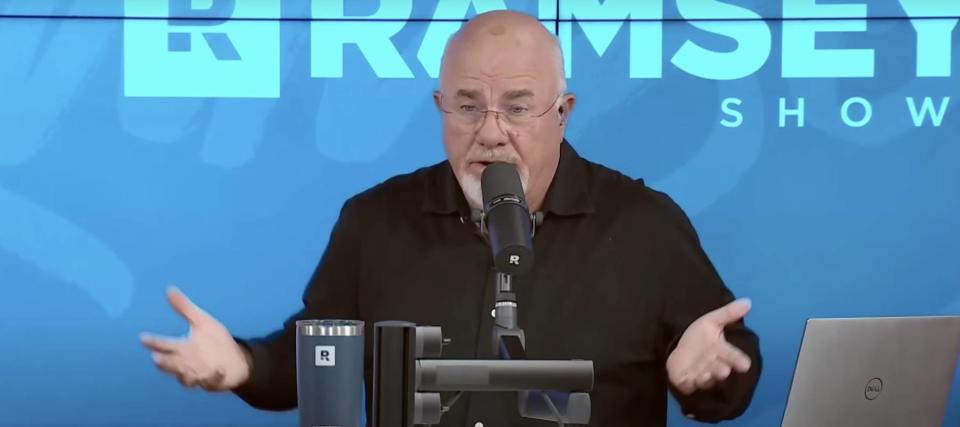'The Roth absolutely, mathematically kicks the traditional's butt': Why Dave Ramsey touts this one IRA account over the other — is it the 'smart move' for the retirement you want?

When it comes to saving for retirement, there are all kinds of options to store (and grow) your funds. Just trying to pick one can feel overwhelming when the stakes seem so high.
Enter Dave Ramsey, a personal finance pundit who's not one to mince his words or fall back on highfalutin' financial jargon. Jane from Kalamzoo, Michigan recently called into The Ramsey show to get the personality's input on Individual Retirement Accounts (IRAs) — specifically which of the two types is superior for saving.
Don’t miss
Commercial real estate has outperformed the S&P 500 over 25 years. Here's how to diversify your portfolio without the headache of being a landlord
Rich young Americans have lost confidence in the stock market — and are betting on these 3 assets instead. Get in now for strong long-term tailwinds
'A natural way to diversify': Janet Yellen now says Americans should expect a decline in the USD as the world's reserve currency — 3 ways you can prepare
"The Roth absolutely, mathematically kicks the traditional's butt," Ramsey told Jane during the episode. "There's no way that the traditional even comes close.”
If you're considering putting your hard-earned money in an IRA to save for your golden years, there are a couple important equations to work out.
If you're unsure of which retirement account is right for you, here's how Ramsey’s Roth logic works out in practical terms.
Crunching the numbers
To make his point, Ramsey used a hypothetical scenario where a 25 year old puts $200 a month in a retirement account for 40 years. That adds up to $96,000 in contributions, which in theory could shoot up to $2.5 million in a decent growth stock fund.
When the IRS comes knocking, the traditional IRA holder who took deductions upfront will be taxed on the full amount, minus $96K — while the Roth holder, who instead paid taxes upfront, owes Uncle Sam nothing.
He wondered: If someone who made $130 put $100 after taxes into a Roth IRA, would they be better or worse off than the person who put the full $130 into a traditional?
That's an apples-to-apples comparison, Ramsey noted, "but here's the problem with that: That's not what people do." That is, $100 feels like $100 to the typical wage earner whether it's before or after taxes.
For Ramsey, it’s the psychology that helps the Roth work its financial magic as much as anything else.
“We cheat you,” he quipped. “We trick you into saving more.”
Read more: Thanks to Jeff Bezos, you can now use $100 to cash in on prime real estate — without the headache of being a landlord. Here's how
A question of tax brackets
Let’s say a 25 year old who makes an adjusted gross income of $50,000 annually contributes $6,500 a year to a Roth IRA and increases future contributions to the maximum allowed.
Assuming a 7% rate of return, and a tax rate that jumps from 24% to 28% in retirement, the Roth may be worth $176,000 more than a traditional: roughly $1,415,000 versus $1,239,000.
Now let’s assume that you’re worried about whether you’ll be in a lower tax bracket when you retire.
In that instance, the Roth’s advantages begin to narrow. Flipping the tax rates to 28% pre-retirement and 24% in retirement, you’ll come out ahead by just $100,000 – and at somewhere around 33% pre and 19% post, you’d break even.
Ramsey agrees that for the traditional IRA to work out over the Roth, you have to be in a dramatically lower tax bracket at retirement. That was the case for Jane, who told him that she belonged to a much higher one during her working years.
But now that she's retired, Jane is having her financial adviser gradually transfer the money from her traditional account into a Roth to keep her "in a very low tax bracket" — to which Ramsey replied: "That is a smart move."
If these numbers still don’t add up for you, it’s never a bad idea to call in a professional financial adviser to help you choose which option is best for your retirement plans.
No matter how old you are or what account you choose, Ramsey’s advice on prepping for retirement can be boiled down to one simple message:
“Shut your butt up and save.”
What to read next
Worried about the economy? Here are the best shock-proof assets for your portfolio. (They’re all outside of the stock market.)
Rising prices are throwing off Americans' retirement plans — here's how to get your savings back on track
Jeff Bezos and Oprah Winfrey invest in this asset to keep their wealth safe — you may want to do the same in 2023
This article provides information only and should not be construed as advice. It is provided without warranty of any kind.

 Yahoo Finance
Yahoo Finance 